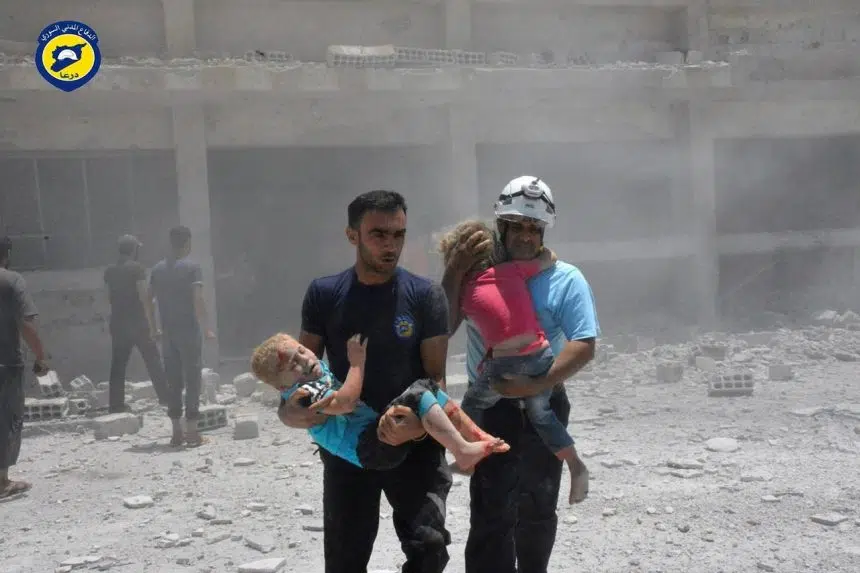JERUSALEM — The Israeli military said Sunday it had rescued members of a Syrian volunteer civil organization from the volatile frontier area and evacuated them to a third country, the first such Israeli intervention in Syria’s lengthy civil war.
Jordan confirmed that 800 Syrian citizens have entered its territory to be resettled in Western countries, including Canada. The volunteers, known as White Helmets, had been stranded along the frontier with the Israeli-occupied Golan Heights following the latest Syrian government offensive in southwestern Syria.
The Israeli military said the overnight operation was an “exceptional humanitarian gesture” done at the request of the United States and its European allies due to “an immediate threat to the (Syrians’) lives.”
The military said its actions did not reflect a change to Israel’s non-intervention policy in Syria’s war, now in its eight year, where all the warring parties are considered hostile.
The Syrians would remain in Jordan for three months before moving on to Canada, Britain and Germany, the Jordanian Foreign Ministry’s spokesman Mohammed al-Kayed said.
“The request was approved based on pure humanitarian reasons,” he added.
In a statement released early Sunday morning Foreign Affairs Minister Chrystia Freeland pledged Canada’s continued support for the White Helmets.
“Canada, working in close partnership with the United Kingdom and Germany, has been leading an international effort to ensure the safety of White Helmets and their families,” she said.
Praising the White Helmets as “courageous volunteers” who risk their lives to help fellow Syrians targeted by senseless violence, Freeland said “Canada will continue to provide significant humanitarian assistance to the people affected by this conflict in Syria.”
Raed Saleh, head of the Syrian Civil Defence as the White Helmets are also known, said a number of volunteers and their families were evacuated from a dangerous, besieged area and had reached Jordan. He did not elaborate on the numbers of those evacuated.
The Associated Press first reported on Friday that U.S. officials were finalizing plans to evacuate several hundred Syrian civil defence workers and their families from southwest Syria as Russian-backed government forces closed in on the Quneitra province, along the Golan Heights frontier.
The officials said the White Helmets, who have enjoyed backing from the United States and other Western nations for years, were likely to be targeted by Syrian forces as they retook control of the southwest. Evacuation plans were accelerated after last week’s NATO summit in Brussels.
Since the Syrian government offensive began in June, the area along the frontier in the Golan Heights has been the safest in the southwestern region, attracting hundreds of displaced because of its location along the disengagement line with Israel, demarcated in 1974 after a war. Israel has occupied the Golan Heights since 1967. Thousands of civilians had taken shelter near the frontier to escape the government offensive.
The Syrian government is unlikely to fire there or carry out airstrikes for fear of an Israeli response.
Meanwhile, Syrian forces kept up their offensive, pounding the southern tip of the southwestern region where an Islamic State-affiliated group still holds territory.
The Syrian Observatory for Human Rights said the bombing — 130 airstrikes since Saturday — displaced 20,000 civilians while an estimated 10,000 remain trapped in the area controlled by the militants, with their fate unknown.
The White Helmets typically have operated in opposition-held areas across Syria, places where government services are almost non-existent, voluntarily risking their lives to save hundreds of civilian lives during relentless government airstrikes and bombardments.
The government and Russia view the White Helmets as “agents” of foreign powers and have regularly accused them of staging rescue missions or chemical attacks.
Syrian state TV Al-Ikhbariya reported the Israeli evacuation of the White Helmets, calling it a “scandal” and saying “terrorist groups” now have “zero options.”
Over the last month, Syrian government forces aided by Russian air power have swept through southwestern Syria to consolidate government control over this strategic corner of the country that straddles the border with Jordan and the frontier with Israeli-occupied Golan Heights.
With its new advances, government forces are, for the first time since the civil war began in 2011, retaking this territory from the rebels and restoring their positions along the disengagement line in the Golan Heights.
Since the offensive began, Jordan said it will not open its borders to the newly displaced Syrians. Jordan hosts at least 650,000 registered Syrian refugees, according to the U.N., but Amman says a similar number of undocumented Syrians are also in the kingdom.
During the latest Syrian government offensive, which began on June 19, around 300,000 Syrians have been displaced, heading toward the sealed Israeli and Jordanian borders in what the U.N. said was the largest single displacement since the Syrian civil war started in 2011.
Some Syrians have opted to be evacuated to northern Idlib province, where the opposition still holds territory. Thousands of armed men and their families were evacuated over the weekend. The Observatory said two buses carrying evacuees were held up by a pro-Syrian government militia, apparently after they went off road.
Panicked passengers, fearing for their lives, posted pictures of the militia surrounding their buses on social media.
Al-Kayed, the Jordanian spokesman, said the transfer of the 800 Syrians does not put the kingdom under any further obligations.
Israel has been sending aid into Syria for several years and has provided medical treatment to thousands of Syrians who reached the Golan Heights frontier. In the past two years, the Israeli military says it has delivered more than 1,500 tons of food, 250 tons of clothing and nearly a million litres of fuel.
The Israeli military said it will continue to aid those in need but won’t allow a massive influx of refugees into the country.
___
El Deeb reported from Beirut. Associated Press writer Fares Akram in Amman, Jordan, contributed to this report.
With files from The Canadian Press
Aron Heller And Sarah El Deeb, The Associated Press







